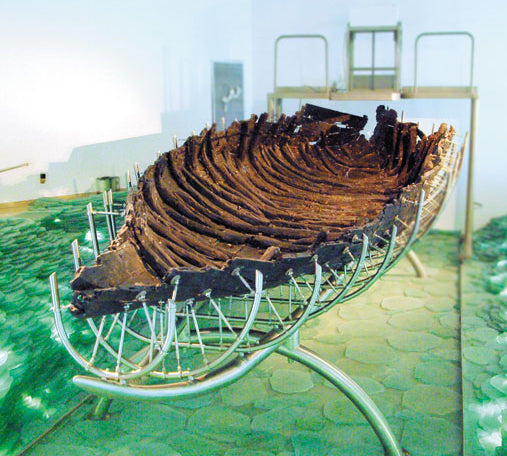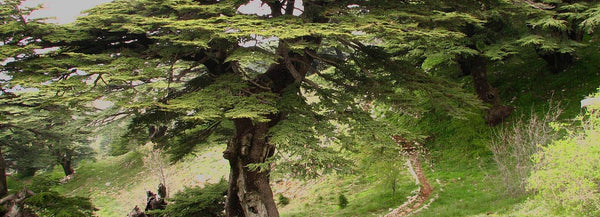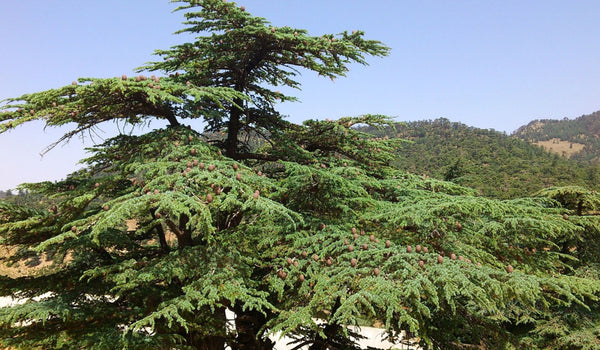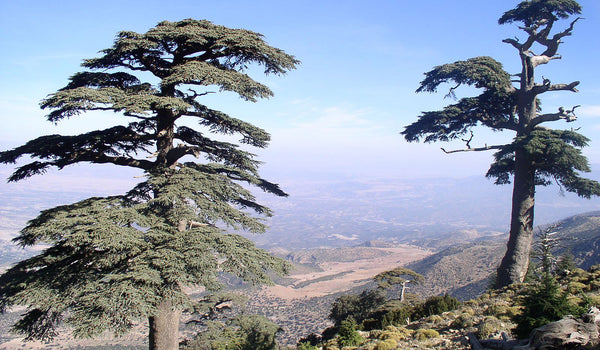The over-harvesting of Atlas Cedarwood
Sweet. Dry. Spicy. The fragrance of cedar wood evokes a feeling of wide open forests, fresh cut wood and damp earth beneath bare feet. In aromatherapy, Cedarwood is often used for calming emotions and give an overall feeling of being grounded. Some practitioners even use this oil as a supporter for lung health and even an aphrodisiac with its masculine, yet universally appealing fragrance.
In the world of natural fragrances & aromatherapy, there are 3 main varieties of cedar commonly found:
- Himalayan Cedar ( Cedrus deodara ) ; Found in the Himalayan regions of China & Nepal
- Virginia ( Red ) Cedar ( juniperus virginiana ) ; Actually a species of Juniper, with a classic dry cedar-chest aroma. Native to the Eastern US
- Atlas Cedar ( Cedrus atlantica ) ; Grown in Northern Africa, a tall, slow growing evergreen. Also known as the Cedar of Lebanon.

First Century A.D ship, party composed of Lebanon Cedar
History & Historical Uses
Cedar’s history is expansive, from being used as the building materials for the sarcophagi in the ancient Egypt, to being a staple ingredient ancient ( and modern! ) perfume and incense by the Tibetans. The timber was even used for homes and temples by the Peonecians. Groves of these fragrant trees wood were even believed to be dwelling places of the Sumerian Gods.
Cedar wood is naturally weather and decay-resistant, which has made it a choice building material for millennia. Unfortunately these appealing qualities have come at a cost for one species: C. atlantica, or commonly known as Atlas Cedar.
Blankets of these towering evergreen trees once covered the tall mountains of Northern Africa, but after centuries of drought, fires and unregulated cutting, these slow-growing trees have seen such a dramatic decline in population that they are now listed as ENDANGERED by the IUCN.
In an article written by Kelly M. Ablard, PHD;
“ The conservation status of Atlas cedar (C. atlantica) is never noted in profiles [ prior to 2013 ], because there was no conservation status for this species until 1998, when it was then categorized as a species of Least Concern, meaning the risk of its extinction was low (IUCN, 2017). Unfortunately, in 2013, just 15 years later, new data revealed that it is endangered (Thomas, 2013; IUCN, 2017).
A species is deemed endangered when natural population numbers decrease ≥50% over 10 years or 3 generations, assessments of wild and mature adults total less than 2500 and the numbers are declining, and there is a 20% probability of its extinction within 20 years or 5 generations (IUCN, 2017).”
Read the full article here.
Unfortunately, the evidence is substantial. The problem is 2 fold - the species C. atlantica is slow growing, which means that once the wild population have been diminished, it takes decades, if not centuries, to regrow. The second issue is economical - supply and demand. As I mentioned on in my earlier post about sustainability , the aromatherapy & natural market is boooooooming, which means a HUGE demand for natural crops that just are not able to meet the needs of todays consumers.
This is why it is so important for MIZU brand to create natural products with sustainability in mind. In order to preserve the species of plants we love, we need to consume more mindfully and find a balance with what is appropriate and when to use it.

Sustainable Atlas Cedar
Earlier this year I announced an initiative to be more sustainable in the way that I create natural products. As part of this initiative , I’ve been taking deeper looks to the lifecycle of my natural ingredients.
Atlas Cedarwood has been the first ingredient I use that I’ve found to be flagged with sustainability issues.
In terms of fragrance, Atlas Cedar has an aroma that seems to be the meeting point between it’s sweeter smelling cousin, Himalayan Cedar, and the more dry- sharp fragrance of Virginia Cedar.
In my natural fragrances and candles, I use Atlas Cedar sparingly, but I DO use it. Creating products that are not only NATURAL but sustainable is hugely import to me, so this left me with the question:
Do sustainable varieties exist?
Yes. Upon researching the subject, a sustainable sourced Atlas Cedar IS available - a simple google search will provide results ( but please, KNOW who you are buying from- research! )!
This is great news, for many oils that are earmarked as endangered or hold sustainability issues ( such as spikenard ) do not have any direct alternatives. Many times you have to avoid using the Ingredient all together if you want to create sustainably.
The Atlas Cedar I use in my products is now sourced from a small supplier in Morocco. They only distill the leftover wood shavings, roots and sawdust from trees that were used in building materials from other companies. Furthermore, they sponsor a cedar re-plantation program to help secure future generations of cedar to survive.
While there are sustainable options of Atlas Cedar wood, they can be costly and, depending where you are located, difficult to find. The following are sustainable alternatives that have the same family of aroma, though slightly different.
Safe Alternatives: ( Classified by the IUCN as “ Least Concern “ )
- Himalayan Cedar [ C.deodara ]
- Virgina Cedar [ J. virginiana ] *
- Texas Cedar [ J. ashei ]
- Westen Red Cedar [ T. plicata ]
- Eastern White Cedar [ T. occidentalis ]
*For Therapeutic purposes, Virginia Cedarwood mostly closely resembles the range of healing properties offered by Atlas Cedarwood, including antiseptic, anti fungal and antibacterial qualities.
Virginia Cedar is so abundant it is considered a ‘Pest Species’, which is why the IUCN has deemed it a status of “Least Concern”
Other Species to Avoid Using :
- Port Orford Cedar - ( Near Threatened )
- Hinoki [Japanese Cedar ] - ( Near Threatened )
RESOURCE
If you ever have any concern about the endearment of a plant species, this website is a great tool. Plug in the plant name and it will help identify if it is threatened or not.

The Hope for Cedar
Cedar trees are not only hardy but smart. They’ve developed an ingenious method in defending themselves from adversity- using their essential oils.
Analysis of the essential oils produced from the leaves of Atlas Cedar trees effected from either poor soil conditions or insect attack/infestations show a sharp increase in terpene compounds ( a natural insect repellent ), and protective resins, in comparison to the trees that were grown in normal healthy conditions. This just shows how incredibly adaptive these trees are to the challenges of life. It’s no wonder they were held in such high regard since nearly the dawn of civilization.

